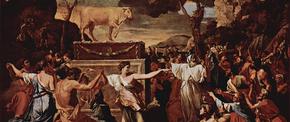The views expressed in our content reflect individual perspectives and do not represent the authoritative views of the Baha'i Faith.
The same universal law which governs evolution throughout the entire creation also governs the evolution of religion.
Evolutionary by nature, religion unfolds across a series of cycles, each with built-in phases of maturation, decline, and renewal, with each contributing toward greater and greater levels of unity to the whole. Each cyclical expression of religion has a hidden potential within it, just as all other living expressions of the Creator develop from seed to fruit.
RELATED: The Names of the Prophets Create a Family Tree
Viewing reality as one, we also have to view Divinity as one, and this requires seeing Divine truth as one, though it unfolds gradually and progressively, all the while coming from the same Source. Truth is not known and fixed for all time but rather revealed little by little. The Baha’i teachings revolve around this fundamental principle, as the Guardian of the Baha’i Faith, Shoghi Effendi, wrote:
Religious truth is not absolute but relative … Divine Revelation is progressive, not final. Unequivocally and without the least reservation [the Baha’i Faith] proclaims all established religions to be divine in origin, identical in their aims, complementary in their functions, continuous in their purpose, indispensable in their value to mankind.
Baha’is believe that the Creator, as the architect of creation with a master blueprint, interacts with humanity in an ongoing way to ensure that all things unfold according to this design and fulfill the destiny they have been created for. The nature of religion, as described by Baha’u’llah, the prophet and founder of the Baha’i Faith, provides a recurring “measure of the light of God”:
As the body of man needeth a garment to clothe it, so the body of mankind must needs be adorned with the mantle of justice and wisdom. Its robe is the Revelation vouchsafed unto it by God. Whenever this robe hath fulfilled its purpose, the Almighty will assuredly renew it. For every age requireth a fresh measure of the light of God. Every Divine Revelation hath been sent down in a manner that befitted the circumstances of the age in which it hath appeared.
Religion, designed by the Creator as the system which evolves creation toward its fulfillment, is revealed sequentially. In order to carry out this divine process, humanity’s spiritual heritage has been punctuated by periodic messages from the Creator, its progress accelerated by the release of spiritual energies in each cycle designed to carry civilization forward. Religion is built upon a dynamic sequence of divine messengers who guide and educate humanity from age to age. As Abdu’l-Baha, the son and successor of Baha’u’llah put it: “Religion is the outer expression of divine reality. Therefore, it must be living, vitalized, moving, and progressive.”
With this unique perspective, we can see that the founders of the world’s major religions – including Abraham, Krishna, Zoroaster, Buddha, Jesus, Muhammad, and Baha’u’llah – have each offered a new perspective in the unfolding of a single reality. They have each expanded the scope of our relationships and led us closer to a clearer understanding of the purpose of religion itself, as the Baha’i writings confirm:
The fundamental purpose animating the Faith of God and His Religion is to safeguard the interests and promote the unity of the human race, and to foster the spirit of love and fellowship amongst men.
In this way, the Baha’i teachings unite all religions into one successive series of spiritual chapters.
If Everything Evolves, What About Religion?
Since Darwin in the mid-19th century, we now understand that not only everything evolves – life, society, cultures, civilization, science, and technology – but also that evolution itself is a central “condition to which all theories, all hypotheses, all systems must bow … a light illuminating all facts, a curve that all lines must follow,” as Teilhard de Chardin put it.
Perhaps the only area of human consciousness we haven’t yet accepted as evolutionary is humanity’s relationship to the sacred – religion itself. This idea, that all religions could be seen as pieces of the same puzzle, or branches of the same tree, is missing from leading definitions of religion. Prevailing views of religion try to keep the branches separate from the trunk of the tree, describing them as different trees altogether.
Referring to the prophets of God, the religions they have founded, and how those Faiths have renewed and evolved over time, Baha’u’llah wrote:
These principles and laws, these firmly-established and mighty systems, have proceeded from one Source and are the rays of one Light. That they differ one from another is to be attributed to the varying requirements of the ages in which they were promulgated.
Currently, we have entered one of religion’s recurring renewal phases. Our age requires a leap of consciousness to bring about a shift from national unity to global unity. This will in turn require living with a heightened awareness and practice of oneness, which signifies the culminating phase in humanity’s evolutionary journey to an aligned relationship with the Sacred.
Signs of this emerging global consciousness become more and more evident as the concepts of a global economy, a world community, and world citizenship increase. One interdependent human community with one common heritage and destiny is becoming more understood as the only sustainable worldview left to live by.
RELATED: The Unconscious Impact of a New Religion
When Did a Global Consciousness Come About?
A closer, deeper look at the evolution of religion reveals that this leap of consciousness began to take place in the mid-1800s, when religious scholars looked to the Holy Land and Persia as places where prophetic scripture might be fulfilled, even during a time when divisiveness and intolerance had reached a tipping point. It was then that Baha’u’llah, founder of the Baha’i Faith in Persia, revealed the new spiritual teachings of the Baha’i Faith, such as “The earth is but one country, and mankind its citizens”, which identified the primary need of this time in history as the consciousness of the oneness of humanity.
Over the course of many spiritual cycles, humanity’s consciousness has taken a leap with each new cycle, as the flood gates for new discoveries were opened with each one. The founders of the world’s major religions – Abraham, Krishna, Moses, Zoroaster, Buddha, Christ, Muhammad, and in our time, Baha’u’llah – each in their own way transformed the spiritual life of the peoples of the world and guided the course of human existence over the last four millennia. Their corresponding impact on society has helped expand the focus on each level from unity in the family, to the tribe, to the city-state, to the nation, and finally, to where we are now, building unity on the global scale.
The Baha’i Faith understands religion as the stimulus and motivation for change and progress in society. This happens through the transformative power in its spiritual values, ethics, principles, and teachings that are actually intended to advance human consciousness and actions toward constructing a better world. The next essay in this series will look at what it means to view all religions as branches of one tree.
Adapted from Robert Atkinson’s The Story of Our Time: From Duality to Interconnectedness to Oneness, Sacred Stories Publishing: https://amzn.to/3jK8lHJ
















Comments
Sign in or create an account
Continue with Googleor